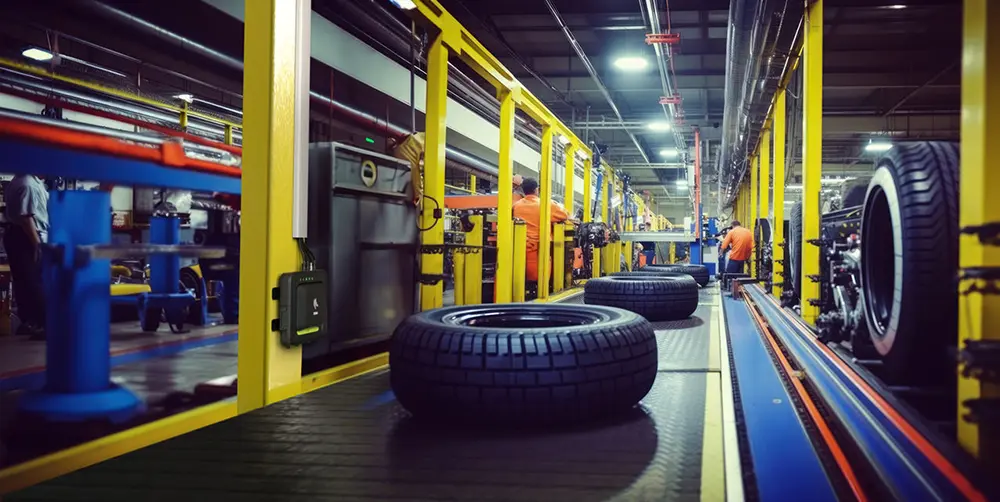RFID technology offers tire manufacturers a sophisticated solution for tracking tires throughout the manufacturing process. Unlike traditional barcode systems, RFID tags can be read wirelessly and without line-of-sight, enabling seamless tracking and identification of tires at every stage of production. This enhances efficiency by automating data collection and reducing reliance on manual processes, ultimately accelerating manufacturing cycles and optimizing resource utilization.
For trucking companies, tires aren’t just components—they’re critical assets with a direct impact on safety, fuel efficiency, and maintenance costs. By embedding passive RFID tags into each tire, fleets can track key lifecycle data even when trucks are out on the road. These tags store unique identifiers that link to detailed records in the company’s asset management system.
In this article we’ll cover the benefits of utilizing RFID technology for both the tire manufacturing industry and also for companies in trucking, distribution, hauling, etc.
RFID Chips in Tires – How it Works
RFID
Module
Production
Assembly
into Coil
Antenna
Embed
Antenna
into Tire
Why RFID Matters for Tire Tracking
For trucking and transportation companies, tires aren’t just equipment—they’re essential to keeping vehicles on the road and operations running smoothly. But keeping track of tire conditions, maintenance history, and replacement schedules across an entire fleet is no easy task.
Traditional methods—like spreadsheets, visual inspections, or paper records—can be slow, inaccurate, and hard to maintain.
As fleets grow and routes become more demanding, the need for a better solution becomes clear. This is where RFID comes in. RFID technology helps companies track tires in real time, monitor their health, and make smarter decisions about maintenance and replacement.
Identify, Track, and Manage Tires at Scale
RFID tags can be embedded into each tire during manufacturing or added afterward. These small chips store a unique ID for every tire—like a digital fingerprint. As trucks move through depots or service centers, fixed or handheld RFID readers automatically scan the tags. No line of sight is needed, and no manual scanning is required.
With this system in place, fleet managers can instantly see:
- Where each tire is
- How many miles it has traveled
- When it was last inspected or rotated
- Whether it’s due for replacement
This data helps reduce downtime, prevent blowouts, and ensure that every tire is being used as efficiently as possible.
Raising Inventory Accuracy with RFID
RFID can assist tire manufacturers and transportation companies keep track of tires both in use and during production. According to the Auburn University RFID Lab, RFID can improve inventory accuracy from 63% to over 95%, reducing stockouts and overstock scenarios dramatically.
Real time Visibility
RFID chips in tires provide real-time updates that help operations run smoother. Fleet managers can quickly see which tires are due for inspection or replacement, even across multiple locations. This reduces the risk of roadside failures, improves safety, and ensures compliance with maintenance schedules.
In addition, RFID improves inventory control. Whether you’re tracking new tires in storage or keeping tabs on which tires are mounted on which vehicles, RFID eliminates guesswork and manual errors. With better data, your team can make faster, smarter decisions.
Smarter Tires, Smarter Fleets
RFID chips in tires turn a basic asset into a smart, trackable resource. Tires can now carry their own data, report their status, and help you plan proactively. For trucking and transportation companies, this means better safety, lower costs, and more reliable fleet performance.
Up next, we’ll break down some of the most common RFID scanning errors that can occur—and how to fix them before they impact your operation.

Benefits for Manufacturers
Tire manufacturers face growing pressure to streamline production, improve traceability, and meet evolving regulatory and customer demands. As a result, many are turning to RFID chips in tires to gain greater control over operations and unlock real-time insights. By embedding RFID technology directly into each tire, manufacturers can digitize their workflows, eliminate guesswork, and scale more efficiently across the supply chain.
Here are some of the key benefits:
Smarter Inventory Control
RFID offers real-time visibility into tire inventory across plants, warehouses, and distribution hubs. With RFID, manufacturers can track tire movement, identify stock levels instantly, and reduce discrepancies caused by manual logging.
By automating the tracking process, companies can optimize inventory turnover and fulfill customer orders faster—with fewer delays or backorders.
Streamlined Production Workflows
RFID enables tire manufacturers to automate key steps on the production line. For instance, readers can detect RFID tags embedded in tire casings and trigger specific manufacturing parameters—without the need for manual input.
This automation reduces setup time, minimizes human error, and allows for faster changeovers between SKUs. As a result, production becomes more agile, especially in plants with high product variation or custom builds.
Better Quality Control
With RFID, manufacturers can track every tire’s production history—including batch data, inspection results, and test outcomes—by associating it with a unique ID. This enhances accountability at every stage and makes it easier to enforce quality standards.
If an issue is detected, teams can trace it back to the exact time, materials, or equipment involved—helping to contain problems faster and reduce costly recalls.

Benefits for Trucking / Transportation Companies
In the transportation industry, where uptime, safety, and efficiency are everything, tires are both a critical asset and a common failure point. Yet, they’re often one of the most under-tracked components in a fleet. By embedding RFID chips in tires, trucking and logistics companies can transform how they manage, maintain, and monitor tire health—saving time, cutting costs, and improving road safety.
Improved Visibility
With RFID, every tire becomes traceable. Fleet managers can see key data such as when and where a tire was installed, how many miles it has traveled, when it was last inspected or rotated, or which truck it’s currently mounted on
This visibility enables smarter planning, quicker troubleshooting, and stronger control over tire performance across the fleet.
Smarter Maintenance and Rotation
Rather than relying on scheduled inspections or manual logs, RFID chips enable condition-based maintenance. This allows teams to rotate or replace tires based on real wear and usage—not just estimates.
As a result:
- Tire life is extended through timely rotation
- Blowouts and costly breakdowns are minimized
- Technicians can focus on tires that need attention instead of wasting time on guesswork
Compliance Made Easy
Inspection requirements often vary depending on the region, vehicle type, and regulatory body. For fleet managers, keeping up with these checks manually can be time-consuming and error-prone. RFID simplifies the process by automatically logging tire inspections, mileage, and location data as part of the normal workflow.
This automation helps ensure that inspections happen on time and that accurate records are always available. When audits arise, teams can easily demonstrate compliance with clear, time-stamped records—no manual entry or paperwork required. The result is less administrative burden and a smoother path to staying compliant across every vehicle in the fleet.
Conclusion: Smarter Tires, Stronger Operations
As the demands on manufacturers and transportation companies continue to grow, traditional methods of tire tracking and maintenance are no longer enough. Whether you’re producing millions of tires each year or managing a fleet that runs around the clock, RFID chips in tires offer a smarter, more efficient way to stay ahead.
For manufacturers, RFID improves production visibility, ensures quality control, and strengthens supply chain traceability—from the factory floor to final delivery. For transportation and logistics operators, it means real-time insights, fewer roadside failures, easier compliance, and better tire performance over the long haul.
In short, RFID turns tires into intelligent assets—each one capable of telling its own story, from creation to retirement. The result is greater safety, stronger data, and better decisions at every stage of the tire lifecycle. As the industry moves forward, those who invest in RFID now will be the ones leading with precision, accountability, and confidence.
Interested in RFID?
An RFID tracking system can help organizations of all sizes improve their supply chain efficiency. Contact the CYBRA team to schedule a demo today.
















